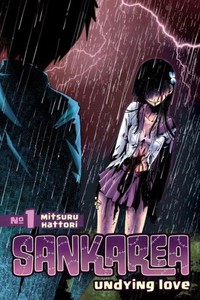Review
by Rebecca Silverman,Sankarea: Undying Love
GN 1
| Synopsis: |  |
||
Furuya Chihiro has a thing for zombies. Not only does he love zombie films, toys, and other paraphernalia, he also has a dream of finding a cute zombie girl to be his girlfriend. His obsession takes a weird turn when his cat Bub is killed by a car and he decides to try and reanimate the feline using a mysterious text he discovered a while ago. While he is working on Bub's resurrection, he meets Sanka Rea, a beautiful but troubled girl who asks him to bring her back to life if she ever dies. Chihiro agrees, but when events take a sinister turn, will his zombie dreams turn to a terrible reality? |
|||
| Review: | |||
Mitsuru Hattori's Sankarea is nominally a romantic comedy. How could a story about a guy who likes dead girls romantically, has a wacky senile grandfather, a weird sister, and a touchy-feely fanservicey cousin be anything but? Despite all of this set up, however, to say nothing of the other trappings of shounen romance that litter the tale, Sankarea is actually rather a sad story about a girl who can only find escape through death and a boy whose dreams come true in a way that isn't quite what he was hoping for. The very first page of the story shows a girl with her intestines hanging out staggering towards our hero. (Heck, that's on the cover as well.) We then quickly switch to romantic comedy mode, with Chirio walking to school with his two buddies, Stereotypes One and Two (horny guy and quiet guy). The boys attend an all-male school, while across the river is an all-female school, the prestigious Sanka Girls' Private Academy. The daughter of the school's first family, Sanka Rea, has just begun her freshman year and she is everything a well-bred young lady should be. But Chihiro knows another side of her – at night Rea goes to the abandoned hotel where Chihiro is attempting to resurrect his dead cat Bub and screams. One night she notices Chihiro and the two become friends. She helps him in his work and responds with a strange seriousness to his jokes about her becoming a zombie. Rea, it turns out, is deeply unhappy. Her family life is horrifying on a couple of levels and death, she feels, is her only possible escape. This coupled with the effect Bub's death has had on Chihiro gives the story an ineffable sadness that sinks into your mind and colors the tale. Even when we are laughing at cousin Wanko getting stuck in a pipe or Grandpa running around naked with little “censored” panels, there's still this niggle in the back of your mind that this story is, at heart, tragic. Chihiro's obsession with zombies also begins to take on a desperate tone – his clear grief at losing Bub (for which he is quick to blame himself) and the effect that his grandmother's loss had on his grandfather, to say nothing of his absent mother, indicates that there may be something more to his wish to see the dead walk than we at first assume. Likewise Rea's feeling that she must be reborn in order to truly live is a very sad statement to hear from a sixteen-year-old, although when we see her home life, it is easy to understand why she might think that way. Hattori manages to mix a lot into his story besides that underlying sense of the tragic. There are moments of comedy, which don't work as well as they might have, as well as some action and fanservice. Most of the latter belongs to cousin Wanko, who gets a decent amount of the three Bs shown (boobs, butt, belly), although Rea spends some time in the nothing as well. Her nudity is used more for shock value in a few places rather than titillation, and it works pretty well. Hattori does a good job of drawing the female body, doing an especially good job with braless cleavage when Rea bends over. Chihiro's catlike features don't always work, often seeming at odds with the story, although the effort to create visual comedy is appreciated. Reading this first volume is a bit of an uneven experience. While some readers may know what to expect from the legal stream of the anime some months ago, for the most part this book seems as if Hattori is still feeling his way out with where he wants to go with the story. He tells us that he had originally intended for it to be much different, and a one-shot to boot, and it's clear that he's still firming up his plans. The book ends on a fairly urgent note that could have major implications for the series' ending should he choose the darker route (and one almost hopes he does, since it makes much more of an impression than his comedy), so as of right now it will absolutely be worth reading at least the next volume to see where it goes. Tragicomedy is not unknown in the manga realm, and Sankarea just may be a very good entry into that genre. This introductory volume offers us sadness, hope, and humor with a dollop of fanservice to top it off and generally speaking is fairly promising. It doesn't impress fully yet, but it does have promise. For right now, that's enough. |
|
The views and opinions expressed in this article are solely those of the author(s) and do not necessarily represent the views of Anime News Network, its employees, owners, or sponsors.
|
| Grade: | |||
Overall : B
Story : B-
Art : B
+ Fascinating fusion of comedy, tragedy, and romance, some nice imagery. Definitely interesting. |
|||
| discuss this in the forum (7 posts) | | |||
| Production Info: | ||
|
Full encyclopedia details about Release information about |
||